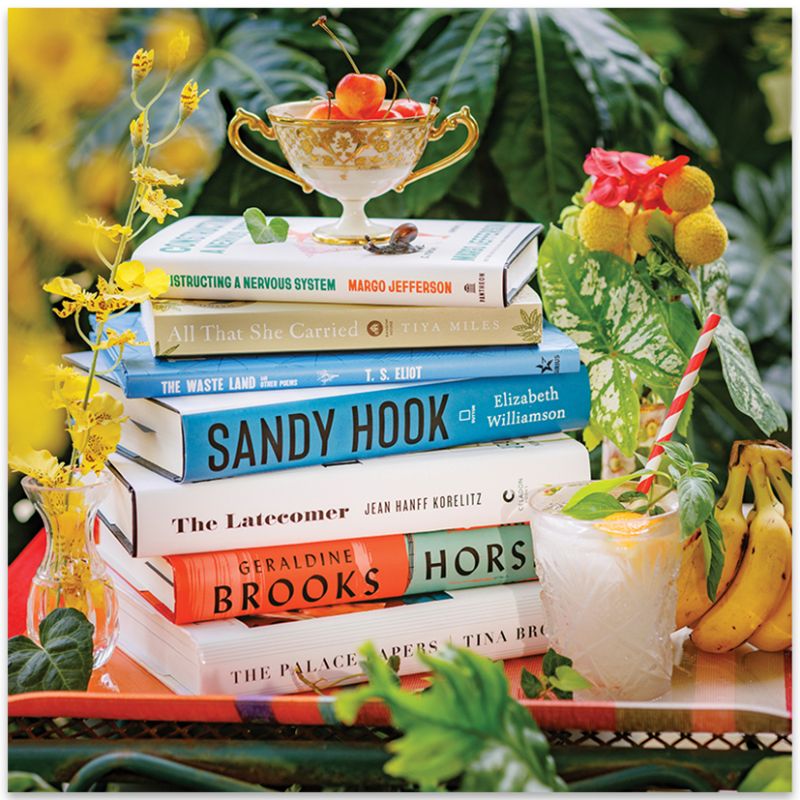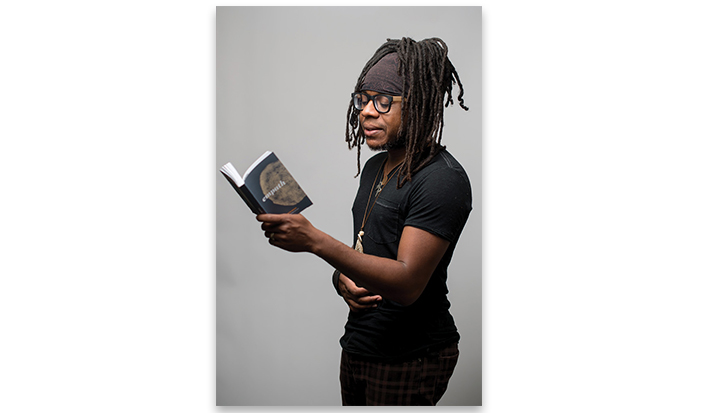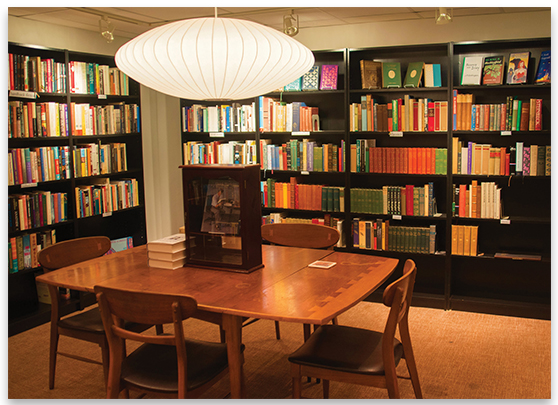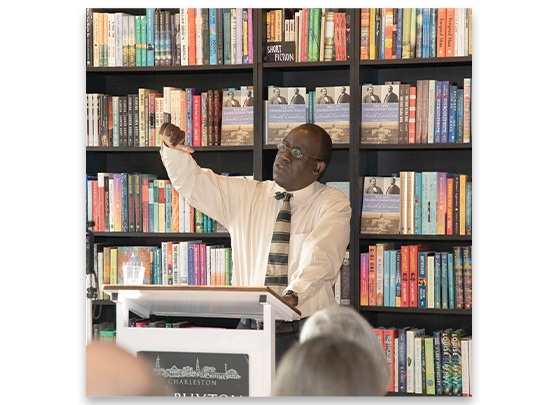Read chapter and verse on the Holy City’s literary landscape

As autumn’s cooler temps arrive in the Lowcountry, leaves begin to rustle. And not tree leaves but leaves of books—lots of them. Books clutched by enthusiastic tweens who line up by the thousands along King Street to meet their favorite authors. Books tucked under the tweed jackets of gents and smartly dressed young professionals who crowd into Dock Street Theatre to hear Tina Brown, former editor of Vanity Fair and author of The Palace Papers, set us straight about the royal family. It’s the height of the book festival season—the latest, action-packed chapter in Charleston’s long literary history.
This peninsula and the margins of its shores have long been home to people who share tales that shape who we are as a community. Stories buried in shell middens, as told by the Kiawah, the Edisto, and other native peoples. Stories woven by the enslaved into threshing baskets and embroidered on simple cotton sacks (like Ashley’s sack, now the subject of a best-selling book). Stories carved into plaster moldings and hammered into wrought iron. And yes, stories published in books, some, like John Bennett’s children’s book, Master Skylark, and his celebrated novels written in the early 1900s—tomes from a time when text was rare and prized.
In our earliest days, we were a colony founded on religious tolerance, and thus people of the book—or various books—whether Hebrew Torah, Huguenot Bible, or other testaments in between. We were a community that valued education, boasting the nation’s first public lending library, founded in 1698, which in turn became the Charleston Library Society in 1748, which then, in 1773, launched The Charleston Museum, the country’s first.
Charleston is also home to the nation’s first municipal college, now the state-funded College of Charleston, chartered in 1785. And home to the still-thriving Poetry Society of South Carolina, the oldest group of its kind in the country, founded in 1920. There were readers and writers—the pious and the poetic, the erudite power brokers and the democratic educators, the reverent and the renegade—behind each of these firsts.
The city reached her cultural and literary zenith in the early 20th century during the Charleston Renaissance, “a period roughly between the two world wars, when an intense pressure was exerted locally, and in that cultural compression everything in Charleston turned upside down,” explains historian Harlan Greene, author of Mr. Skylark: John Bennett and the Charleston Renaissance, among other books (including his latest, The Real Rainbow Row, which chronicles local LGBTQ history). During this time, an onslaught of outsiders came to town bringing new ideas, new dreams. A creative tension bubbled up between the old ways and new outlooks elbowing in.
“Before this, the city had been a place where things had happened, but now Charleston became a place where things were happening, where artists and writers were challenged, where values were questioned, and a self consciousness arose of what Charleston had been and could be,” Greene says. Sound familiar?
Today’s Charleston bears much resemblance to its renaissance of yore. “Those pressures of change are ongoing, and the challenges and contradictions remain,” he adds. “And because the city came to value the arts as a resource, as a voice of expression, and even as a way toward equality, we, the inheritors of that legacy and that tension, are primed and energized to continue to create.”
Get Lit: The Events
Charleston’s later-day renaissance that led to our current status as a tourism-fueled, crane-dotted boomtown topping numerous world number-one lists started, arguably, with a festival: Spoleto Festival USA, to be exact, now 45 years old. Turns out that Charleston loves festivals the way New Orleans loves Mardis Gras. In addition to Spoleto’s 17-day performing arts bonanza, we have a wildly popular wildlife art expo, a culinary arts fest, even High Water, a groovy music festival. But until recently, book lovers had to go to other major metropolitan areas for their literary fix. No more.
The Charleston Literary Festival (CLF), a 10-day extravaganza of “Books, Ideas, Conversations,” has done for readers what Charleston Wine + Food has done for foodies—made the city a must-visit destination. CLF brings internationally known authors, including Pulitzer, Booker, and Nobel Prize winners, to town for a lineup of 27 events—each a dynamic conversation featuring one or more well-known authors—beginning November 4.
The Charleston Literary Festival, a 10-day extravaganza of “Books, Ideas, Conversations,” has done for readers what Charleston Wine + Food has done for foodies—made the city a must-visit destination.
The festival started in 2017 as an offshoot from a long-standing event put on by the Charleston Trust in Sussex, England, in partnership with the Charleston Library Society. Today, it has evolved into an independent local nonprofit, although it retains a distinctive English accent, largely because its artistic director, Diana Reich, and board president, Deborah Gage, are Brits with deep ties to the original event in Sussex. “After three years of growing success and recognition, it became apparent that the festival could stand on its own, while proudly acknowledging its origins,” says Reich.
Branding itself independently has allowed CLF to develop its own identity and enhance its impact, she adds. “We’ve extended our offerings from four days to 10, and from 14 to 27 events; the festival is now more deeply embedded in the community,” she says, pointing to its academic partnership with the College of Charleston, and this year’s “Charleston Reads” project, whereby the whole city is encouraged to read featured author Imani Perry’s South to America.
In addition to Perry, this year’s lineup features big names and best sellers like Geraldine Brooks, Ian McEwan, Tina Brown, Eddie Glaude Jr., and Jean Hanff Korelitz, alongside locals of note, including poet Marcus Amaker and author Betsy Prioleau. Charleston, says Reich, has proven a hospitable and receptive home for a literary festival. “It’s, of course, atmospheric with lovely historic venues. And its history of slavery pushes us to present a diverse program of events and reach out to all communities,” she adds. “Charleston audiences have proved open to new ideas.”
Then, as soon as CLF bibliophiles start to return home to dive into their new books, the city will be swarmed by young adult (YA) and middle-grade bookworms who show up by the thousands for the phenomenon known as YALLFest. The brainchild of Jonathan Sanchez of Blue Bicycle Books and YA authors Kami Garcia and Margaret Stohl, YALLFest, launched in 2011, has become one of the largest YA festivals in the world and mecca for one of publishing’s hottest genres. This year’s festival (November 11-12) showcases some 77 authors, multiple panels, and a slew of high-energy events, many of them free, including the annual YALLCrawl and the zany YA Smackdown.
“I knew it’d have legs, but it’s been an incredible slam dunk with so much excitement about it,” says Sanchez. Though he says YALLFest started on a whim, the phenomenal growth—with a record 16 sponsors this year—has been “organic and fun. No other genre has so much crossover between fans and authors. We’ve had volunteers become best-selling authors.” New this year, Mount Pleasant resident and yogi-turned-book influencer Kathryn Budig, host of the Inky Phoenix online book club, will host a panel. “She’s much hipper on the latest fiction than I am,” Sanchez adds, though clearly that’s questionable given his finger on the pulse of all things lit and YA—a pulse that will be palpable downtown this month.
To those who fear reading is on the wane, scenes of teens lugging suitcases filled with books to be signed, waiting in blocks-long lines down King Street for their favorite authors, suggest a bright future. Literary traffic jams and flooding by ferocious readers are a refreshing change of pace from the city’s typical woes.
Well Versed
And for those whose literary appetites lean toward poetry and spoken-word, Charleston’s Free Verse, which just marked its sixth year in October, is hitting its stride, or stanzas. When launching the city’s first poetry festival, founder Marcus Amaker, Charleston’s first poet laureate (see sidebar profile), envisioned it as a way to broaden poetry’s appeal and celebrate the power of the written word. “Honestly, my initial vision for Free Verse was ‘Be as cool as O, Miami,’” says Amaker, of that city’s expansive and “legendary” poetry festival. His vision included tangible goals: “Pay poets for their work and worth, present poetry in ways that audiences might not expect, and provide platforms for students and poets to share what they’ve written,” says Amaker, who has turned poetry into public art—liberating poems onto sidewalks, storefront windows, buses and more—and presented “fringe experiences” like Poetry & Pancakes and Typewriter Poetry at the farmers market, as part of Free Verse.
“It’s gotten bigger than I anticipated,” says Amaker, who has brought in high-caliber artists, including Pulitzer Prize-winning poet Jericho Brown, Andrea Gibson, Aja Monet, and Cheryl Boyce-Taylor. “I’m proud of the fact that Free Verse is an outlet for BIPOC and trans voices,” he adds. “Some people might use the word ‘diverse’ to describe what we do. I call it ‘natural.’”
YALLFest, launched in 2011, has become one the largest YA festivals in the world and mecca for one of publishing’s hottest genres.
While these three cross-genre festivals are the marquee moments of Charleston’s literary landscape, a host of ongoing programs and events sponsored by booksellers, libraries, and nonprofits keep the literary fires lit year-round. The Charleston Library Society offers a full calendar of book talks and readings, and the Poetry Society of South Carolina hosts Poetry at McLeod Plantation, as well as readings and workshops by nationally known poets. The Charleston County Public Library and Friends of the Library hosts the seventh annual Black Ink Festival, celebrating African American authors and voices (January 12-14, 2023), as well as a plethora of page-turning opportunities.
Indeed there’s a whole literary ecosystem thriving in our culture-drenched climate. Seeds get planted and budding writers nurtured thanks to YALLFest and Free Verse’s outreach to schools and the Write of Summer kids’ writing camp run by Blue Bicycle Books. Those new writers mature and begin adding their own voices, thanks to the CLF’s partnership with the College of Charleston and its MFA in creative writing, added as a degree program in 2016. They’re then encouraged and supported by a sense of camaraderie among the local writing community, and readers are bolstered by organizations such as the Charleston Library Society and independent bookstores, which are thriving thanks to an eager book-buying public.
The cycle, the story, continues. “The Wheel of Time”—also one of the publishing world’s top blockbuster series by the late Charleston fantasy writer James Rigney Jr. (pen name Robert Jordan)—keeps rolling onward. More chapters are yet to be written in the city’s long and still-unfolding literary saga, and time will tell how the future of publishing shakes out. But for now, books await, and the fall’s literary festivals are bringing their authors to you. Let’s keep turning the pages.
Local Writers
Bookstore displays featuring local authors are getting crowded these days, thanks to an abundance of Lowcountry talent. From breezy beach reads to historical fiction, from YA to essays to short stories and children’s books, no matter your reading tastes, there’s a Charleston writer to match. This list is by no means comprehensive, but it’s a start should you want to venture beyond—but definitely include!—Pat Conroy in building your Lowcountry canon. >>CLICK HERE TO READ MORE

Charleston’s First Poet Laureate
Since being named the Holy City’s first poet laureate six years ago, Marcus Amaker (pictured above) has visited more classrooms and taught more workshops than he can count. And he’s loved every minute of it. “Being in the community and of the community is essential to a poet’s voice,” he says. “As poet laureate, I challenged myself to learn more about Charleston and be an informed student of our city’s history. I experienced things that wouldn’t have happened without the title.”
Amaker winds up his tenure having created a successful poetry festival, launching a publishing platform, and holding on to some yet-to-be-realized goals for Charleston. These include a “poetry-specific place with an open door for us to do workshops and make experiences, and, related, a Busboys & Poets [a poetry cafe and bookstore based in the DC area] to expand to Charleston,” he says. “One can dream!”

When Jonathan Sanchez bought Boomer’s Books in 2007, he turned what had been a used bookstore into a vibrant downtown nucleus for readers of all genres. Blue Bicycle Books has since birthed YALLFest, the Write of Summer camps, and the Poets in the Schools program, as well as hosted thousands of author and book launch events over the years.
Finding Your Next Read: Charleston’s Independent Bookstores
Not long ago, as behemoths like Amazon began disrupting the marketplace and platforms like Kindle bypassed the whole printing process, local independent book retailers were thought to be an endangered species. Then—a plot twist. In Charleston and across the country, indie bookstores are actually booming. Turns out people value the friendly smiles and personal recommendations of their neighborhood bookseller; we welcome the sense of cozy community (and cats, as Blue Bicycle’s newsletter, “Yes, It’s a Real Cat”—named for its former mascot—proved) that one uniquely finds at a local book hub. Here’s where to find yours:
Downtown:
Blue Bicycle Books
Charleston’s veteran indie store (formerly Boomer’s Books, which became Blue Bicycle when writer Jonathan Sanchez bought it in 2007) specializes in new, used, and rare first editions and is a champion of writers, hosting more than 200 author events every year. It’s also home base for YALLFest, Write of Summer camps, and a Poetry in Schools outreach program. A New York Times-reporting bookstore. 420 King St., bluebicyclebooks.com
Buxton Books
Owned by Charleston natives Julian and Polly Buxton, this shop, next door to the Charleston Library Society (for which it serves as retail partner), is home to Buxton Tours as well as a Lower King trove of new releases, classics, cookbooks, coffee-table books, and a robust local author section. A New York Times-reporting bookstore. 160 King St., buxtonbooks.com
Mount Pleasant:
The Village Bookseller
Karen-Anne Pagano, aka the “book lady,” opened this spot during the pandemic, when booksellers nationwide took a hit and publishers struggled with paper shortages. But she’s more than survived. There, you’ll find a curated list of all genres, including a delightful kids’ section, gifts, coffee, and tea. It’s an easy stop on the way to the Sullivan’s and IOP for a beach read. 761 Coleman Blvd., thevillagebookseller.com
Park Circle:
Itinerant Literate
What started in 2015 as a bookmobile, Itinerant has become the word hub of North Chuck, where you’ll find an array of all genres tucked into this cheerfully painted cinder block oasis, an open mic night, and a Get Lit Book Club hosted monthly at nearby Junction Kitchen. 4824 Chateau Ave., itinerantliteratebooks.com

King Street’s latest literary retailer, Buxton Books hosts numerous events and readings, such as one by local author Damon Fordham (above).
Want to Get Published?
While the Big Five publishing houses in New York may soon become the Big Four and even harder to break into, smaller publishers are making a name for themselves, including these local presses
Arcadia Publishing/The History Press
Based in Mount Pleasant, Arcadia Publishing and The History Press specialize in hyper-local and regional template-driven books (their “Images of America” series, for example) about cities and locations across the US, publishing some 900 titles each year and boasting an archive of more than 12,000 titles. arcadiapublishing.com
Evening Post Books
Launched in 2008 as an arm of Evening Post Industries (parent company of The Post & Courier), Evening Post is a boutique press that specializes in fiction, nonfiction, and specialty publications by Lowcountry authors on topics related to this region (arts, culture, environment, history, politics, etc). “Our Accent is Southern” their tag line affirms. eveningpostbooks.com
Joggling Board Press
A Summerville-based full-service publisher, Joggling Board produces a select number of titles. They specialize in beautiful coffee-table books and are a “teaching press, offering new, emerging, and established writers in-depth editorial reviews, as well as line edit and proofreading services,” according to their website. jogglingboardpress.com

(Left) Author Lisa Taddeo at CLF in 2021; (right) exuberant YALLFest fans
Mark Your Calendar
Charleston Literary Festival
November 4-13
Multiple author events at Circular Congregational Church and Dock Street Theatre ($10-$35), plus an opening party on November 5 ($175), at Rivers Green at the College of Charleston. charlestonliteraryfestival.com
YALLFest
November 11-12
Author panels and book signings at multiple venues (free). For tickets and prices for the keynote talks and the YA Smackdown, visit yallfest.org.
Free Verse: Charleston Poetry Festival While the bulk of the events occurred in October, upcoming open mic nights are slated for November 18 at Buxton Books and December 9 at Frothy Beard Brewing Co. freeversefestival.com
Photographs by (Margo Jefferson) Leigh Webber Photography & (Taddeo) Mark Staff, both courtesy of Charleston Literary Festival; (4) by David Strauss Photography, courtesy of YALLFest; (Coming to Monuments) Trenise Elmore & (Amaker) Alice Keeney, both courtesy of Free Verse; (bookstores) Blue Bicycle & Buxton Books; & Charleston Library Society